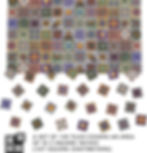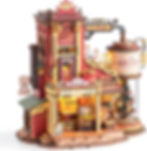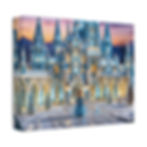The Rosy Studio: A Vigée-Le-Brun–Inspired Artist’s Studio Miniature Diorama
- Brandon
- Sep 5, 2025
- 9 min read
Updated: 5 days ago
Opening – First Impressions in Miniature
If Élisabeth Vigée Le Brun had a weekend cottage where she painted portraits, drank scandalously delicate tea, and hid a cache of secret macarons, it would look exactly like this miniature studio. You’re greeted by a facade that swans between Rococo romance and Second-Empire swagger: a mansard roof flirting with filigreed cresting, carved corbels winking under arched windows, and—be still my heart—that glowing circular window like a sugared medallion.
The garden is doing the most in the best way: topiary with the confidence of a stage star, bloom clusters as frothy as gown ruffles, and easels scattered like the aftermath of a very polite creative storm. The mood? Golden-hour pastel. The vibe? “I paint countesses and occasionally their dogs.”
I’m smitten, and you can bet we’re going to walk through a full build guide later—particularly how to wrangle complex architecture at miniature scale. Keep reading; your cutting mat is going to love this.
Why This Photo Needs VIP Treatment
Heads up: the image you’re seeing here is web-optimized. Translation: delicious on screens, not quite print-sharp enough for your wall gallery. If this scene is whispering “frame me,” I recommend the high-res canvas print version (FREE U.S. shipping), which we’ll add as a link and product photo right here soon. Think of it as a museum pass for your hallway—soft texture, true-to-color, and none of the glare that makes you tilt your head like a confused spaniel. https://www.smallworldminiatures.com/product-page/the-rosy-studio-a-vig%C3%A9e-le-brun-inspired-artist-s-studio-miniature-canvas-print
Miniature Backstory – The Tiny Tale
Name: The Rosy Studio Founded: 1791…ish (time is a social construct when you’re this charming) Owner: Mademoiselle Colette du Minuscule, portraitist to nobility and extremely judgmental housecats.

Local lore says Colette left Paris after a misadventure involving a duchess, a masquerade, and a portrait whose eyes followed you a little too convincingly. She commissioned a studio on the edge of a pink-bloomed grove, where she paints by morning light, hosts salons by lantern, and occasionally teaches tiny apprentices how to capture the soul of a sitter with a single brush flick. Her favorite model is a rabbit named Monsieur Beignet, who refuses to pose unless paid in clover.
Easter egg alert: rumor has it a miniature macaron has rolled under one of the garden easels, and the circular window’s mullions echo the spokes of Colette’s favorite paint palette. See if you can spot both later.
A Guided Tour of the Build
Step up the grand staircase—wide treads, low rise, the kind of stairs that promise dramatic entrances. The balustrade curls like ribbon candy toward a set of triple arched doors glowing honey-warm from inside. The facings are creamy stone with just a kiss of sky-blue edging, a duet that feels like daylight captured in plaster.

Look higher. That hero piece, the circular window, is an illuminated moon of glass set within a wreath of scrollwork, like a cameo suspended mid-aria. It clusters with carved leaves and tiny flourishes that catch the light—each detail dialing the whole facade to “opera house.”
On either side, narrow windows lift the facade like corset boning, and the mansard roof, shingled in tight, elegant runs, wears cresting that could double as a tiara. Garden paths are tiled and tidy; the grass is punctuated by painterly chaos: palettes on tables, pottery brimming with brushes, frames leaning casually as if gossiping.

Out front, easels hold delicate canvases—misty pinks and cloud-blue textures—casting a soft glow in the lamplight. On the right, a tall, stylized tree reaches up in a swirl of trunk and cloud-tuft foliage, equal parts bonsai and daydream. Everything is composed to lead your eye right back to that circular jewel of a window.
Inspirations – From the Big World to the Small
This miniature tips its hat to French Rococo (think ornamental curves and lavish charm), slides into Second Empire with its mansard roof, and refuses to apologize for its romanticism—very Vigée Le Brun. Picture the ornament of the Hôtel de Soubise interiors transposed onto a compact studio facade: scrolls, shells, and floral garlands simplified to read cleanly at scale. Add a dash of Charles Garnier’s Opéra flair for theatrical silhouette, then step down the volume to avoid visual noise in miniature.

In the small world, details can easily overwhelm, so the design borrows Rococo’s movement—curves that guide the eye—while keeping textures fine and rhythmic. The circular window becomes the “portrait medallion,” the stairs the “runway,” and the garden the social circle. Big-world opulence, small-world restraint.
Artist Tips – Make Your Own Magic
You’re about to build a jewel box that looks complicated but behaves if you plan it like a director and work in crisp, repeatable beats. Coffee ready? Cutting blade new? Excellent. Let’s architect some charm.
Sources & Where to Find the Fancy Bits
When your facade craves the good stuff—cartouches, finials, keystones—Sue Cook Miniatures specializes in hand-cast architectural details across historical styles and scales. It’s the kind of catalog that makes you whisper “just one more pediment.” Sue Cook Miniatures+1
For trees and botanicals, reliable staples include Woodland Scenics (tree kits and armatures), Scenic Express (famous SuperTrees—beautiful seafoam for hyper-real branches), The Model Tree Shop (UK supplier with wire and etched options), and NOCH (leaves, natural trees, and landscaping tips). Woodland ScenicsScenic ExpressThe Model Tree ShopNOCH
If you want a quick primer or two before you jump in, skim Woodland Scenics’ Realistic Tree Kits how-to and NOCH’s foliage application guides—short reads, big gains. Woodland ScenicsNOCH
Shopping List (with clever swaps)
Base & Bones
Everyday: Foamcore or cereal box cardboard laminated in layers; tongue depressors for joists; bamboo skewers for columns.
Purchasable: Basswood sheets/strips, 3 mm MDF for base, styrene sheet for crisp moldings.
Architectural Flourish
Everyday: Air-dry clay pushed into silicone baking molds; pressed paper from hole-punch confetti glued in rosette clusters; jewelry findings for escutcheons.
Purchasable: Cast plaster and resin architectural elements (cornices, finials, pilasters) from Sue Cook Miniatures—a treasure trove for classical detailing. Sue Cook Miniatures+1
Windows & Doors
Everyday: Clear acetate from bakery boxes; plastic lids for circular glazing; thin cardstock for muntins.
Purchasable: Laser-cut window/door sets from dollhouse suppliers; round “ox-eye” style windows from specialty shops.
Roof & Cresting
Everyday: Sandpaper shingles; decorative scrapbook borders for cresting; coffee stirrers as slate strips.
Purchasable: Pre-cut shingles and etched cresting strips (photo-etch or resin).
Garden & Greenery
Everyday: Dried herbs (oregano/thyme) for leaf litter, caspia/seafoam twigs for trees, makeup sponge for shrubs.
Purchasable: Tree kits and foliage from Woodland Scenics, Scenic Express SuperTrees, The Model Tree Shop (UK), and NOCH (great leaves and natural trees). Woodland ScenicsScenic ExpressThe Model Tree ShopNOCH
Lighting
Everyday: Vellum/parchment paper for diffusion; drinking straw light wells.
Purchasable: USB-powered micro LED strings or 3V fairy lights; warm 2700–3000K.
Adhesives/Finishes
PVA, superglue gel, matte medium, acrylics (warm neutrals + blush pastels), satin varnish, dark umber wash, pearl glaze (sparingly).
Guides for Trees & Foliage
Woodland Scenics’ how-to pages for tree kits and armatures; NOCH’s tips for adding foliage to natural seafoam trees. Woodland Scenics+1NOCH

Deep Dive
Safety first: Sharp blades are loyal only to physics. Cut away from you; ventilate when using CA glue or spray paints; wear eye protection while sanding and a dust mask if carving MDF.
Planning & Scale Notes
Sketch the elevation. Start with a centerline. Mark the stair width (think generous—your future mini residents deserve a red-carpet moment).
Decide the scale (1:12 or 1:24). If you’re new to complex facades, 1:12 is forgiving—bigger surfaces, more tolerance.
Pick a focal triangle: circular window (apex), arched doors (base corners). Everything else should support, not compete.

Bones (Base Structure)
4) Laminated core: Build the wall planes from two layers of foamcore/basswood sandwiching a thin cardstock layer—this resists warping after paint.
5) Stair block: Stack foam steps like a tiered cake. Wrap with thin card “stone” faces to hide seams.
6) Mansard skeleton: Form a shallow upper roof with card ribs; add lower steep faces for the mansard. Keep the break line clean; that’s where ornamental trim sings.
7) Balustrade blanks: Carve or stack layers of card to imply turned balusters. Don’t fret about perfect symmetry—Rococo loves a little flourish.

Windows & Doors:
8) Arched triptych: Cut three arched openings with a fresh blade. Glue a thin styrene or card surround. Add a shallow reveal (a second inner frame) so glazing sits proud like real mullions.

9) Circular window (the hero):
Form: Layer three rings—outer frame, mullion “spokes,” and inner lip—to create depth. A circle cutter helps; a compass and patience also work.
Mullions: Create radial spokes from thin styrene strip or copper wire. Aim for 8–12 segments—enough to feel ornate without turning into a bicycle wheel.
Glazing: Use clear acetate behind the frame. To mimic old glass, brush on a whisper of gloss gel with a diagonal sweep.
Crown: Top with a cartouche—either sculpted air-dry clay or a purchased resin crest (hello, Sue Cook’s classical motifs). Sue Cook Miniatures

Finishes, Base Color & Materials
10) Stone recipe (painterly, not fussy): Basecoat warm ivory. Stipple toning grays (a cool and a warm) with a makeup sponge. Edge with a soft blue-gray glaze where stone meets sky.
11) Rococo trim: Pick a slightly warmer cream for trim so the structure reads in layers. Drybrush champagne-pearl on high points; stop before it shouts.

12) Roof: Slate tones—blue-gray + a dot of green, then graphite drybrush. For cresting, hit with antique bronze + verdigris whisper to glam without glare.

13) Doors: Pale cream with warm golden glazing inside. Add micro-pinheads painted brass for door hardware.

Hero Piece (focal window) Paint Pass
14) Basecoat the frame in the same trim cream.
15) Wash with 1:8 raw umber to settle into crevices.
16) Drybrush highlight (cream + a breath of white).
17) Glaze the inner ring with a faint peach to echo interior lamplight.
18) Back the acetate with a translucent vellum disc—instant soft glow when lit.
Utilities & Greebles
19) Lanterns: Tube beads + wire brackets. Vellum shades. Warm LEDs behind.
20) Easels & tables: Balsa sticks; keep the grain visible for an artist-at-work feel.
21) Brush jars: Cut straws + silver paint rims. Insert trimmed paintbrush bristles for “brushes.”

Furniture/Soft Goods (just enough to suggest activity)
22) Add a casual outdoor style café chair and a draped linen on a small side table—fine weave cotton, tea-stained.

Lighting (simple & cozy)
23) Run a USB micro-LED strand through the wall cavity. Diffuse windows with vellum; tape LEDs to the back of each opening. Aim for 2700–3000K warm color temperature so your creams and pinks don’t turn hospital white.
24) Hide the battery/USB plug under the base or behind a removable shrub.

Garden: Trees & Blossoms
25) Quick tree recipe (seafoam + leaves): Prime seafoam (caspia) twigs with matte medium. Tint the trunk with diluted brown-gray. Spray adhesive lightly; shake on leaf flake (NOCH Leaves or SuperLeaf). Seal with matte spray. For shape drama, wire an
S-curve into the trunk before flocking. For supply kits and materials, check Woodland Scenics’ tree kits, Scenic Express SuperTrees, The Model Tree Shop’s wire/etched lines, or NOCH’s natural trees and foliage. Woodland ScenicsScenic ExpressThe Model Tree ShopNOCH
26) Shrubs: Tear makeup sponge, paint mid-green, dot with pink/white for blooms.
27) Flower drifts: Sprinkle dyed sawdust or fine foam; fix with misted matte medium.
28) How-to resources: Browse Woodland Scenics’ Realistic Tree Kits and NOCH’s
step-by-steps on adding foliage to natural trees for quick wins. Woodland ScenicsNOCH

Story Clutter/Easter Eggs
29) Tuck a tiny macaron under an easel; lean a frame with an unfinished sketch near the steps. Paint a single pawprint on the tile as Monsieur Beignet’s signature hover-by.

Unifying Glaze/Final Finish
30) Mist a very thin warm gray filter (glaze of paint + matte medium) across stone and trim to harmonize tones. Finish with satin varnish on metal and matte elsewhere. Target variety, not chaos.
Photo Tips & Backdrop
Backdrop: gradient from blush at the base to sky-blue at top to echo the facade.
Side light at 45° for shadow lace on the trim; backlight the circular window for that “halo.”
Shoot a detail pass: cresting, doorknobs, and bloom clusters. Your followers will zoom.

Troubleshooting (problem → fix)
Warping walls → Laminate foamcore + card + foamcore; paint both sides to balance moisture.
Muddy trim details → Switch to drybrush + damp-brush; use a fine liner for shadow lines rather than heavier washes.
Window fogging → Use PVA, not superglue, on acetate; if cloudy, polish gently with plastic cleaner.
Shingles lifting → Burnish with a bone folder after glue tack; seal with matte medium.
LED hotspots → Diffuse with vellum; add a shallow foam baffle behind the window.
Closing – Until Next Time in the Small World
And that’s The Rosy Studio: a little theater of light where Colette paints, the garden gossips, and a rabbit negotiates his clover fee. I’d love to hear your favorite detail—team Circular Window, anyone? Drop a comment, share your own builds with #smallworldminiatures, and if you’re planning your own fancy-facade adventure, tag me so I can cheer from the glue-splattered sidelines.
Want more tiny architecture deep dives and behind-the-scenes? Hop on the newsletter—macaron crumbs and exclusive tips included.
Hashtags
#miniature #dollhouse #diorama #miniatureart #miniaturearchitecture #modelmaking #miniaturescene #scale_model #woodlandscenics #scenicexpress #noch #suecookminiatures #artiststudio #rococo #secondempire #mansardroof #handmade #craftblog #hobbycrafts #dollhouseminiatures #modelrailroadscenery #tinyworld #artcollector #vigeelebrun #gardenminiatures #ledlighting #foamcorebuild #scratchbuild #smallworldminiatures

























































